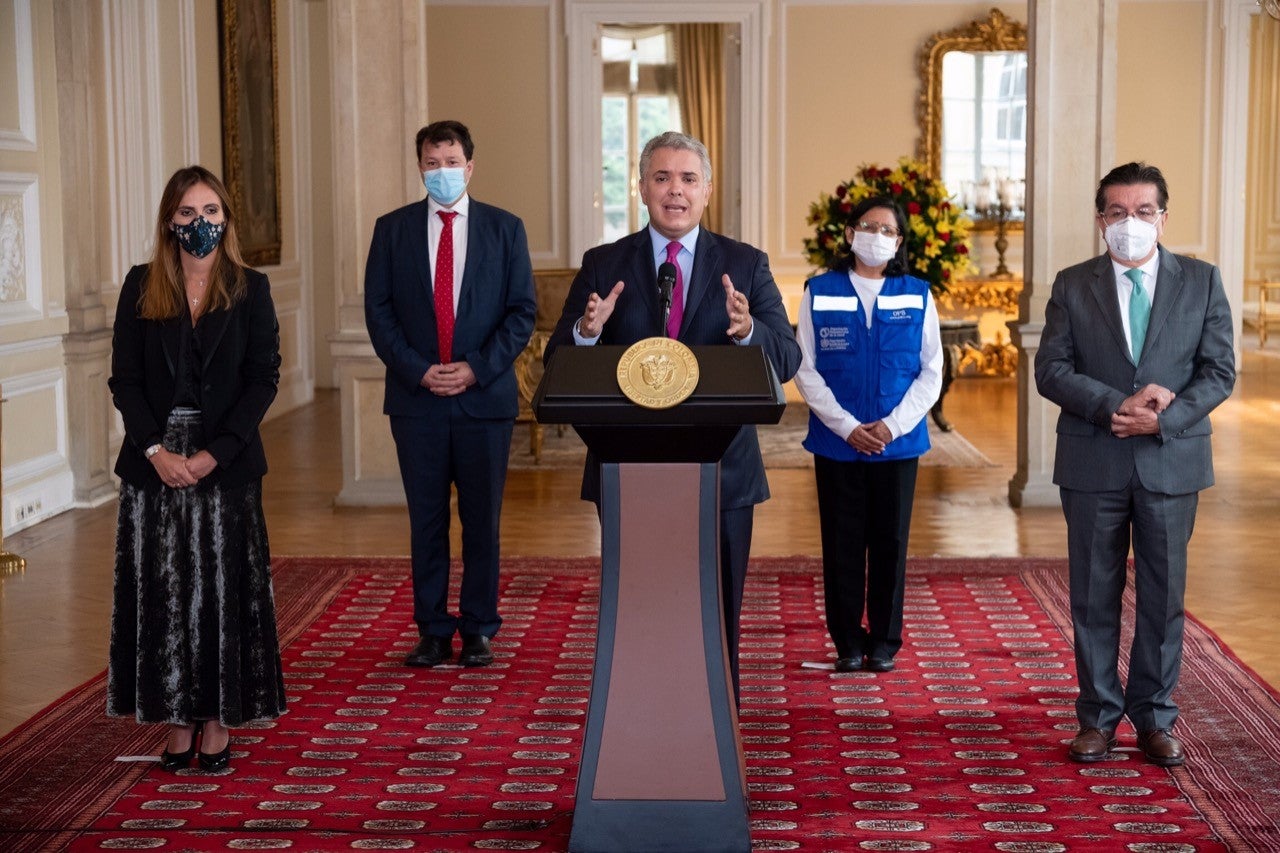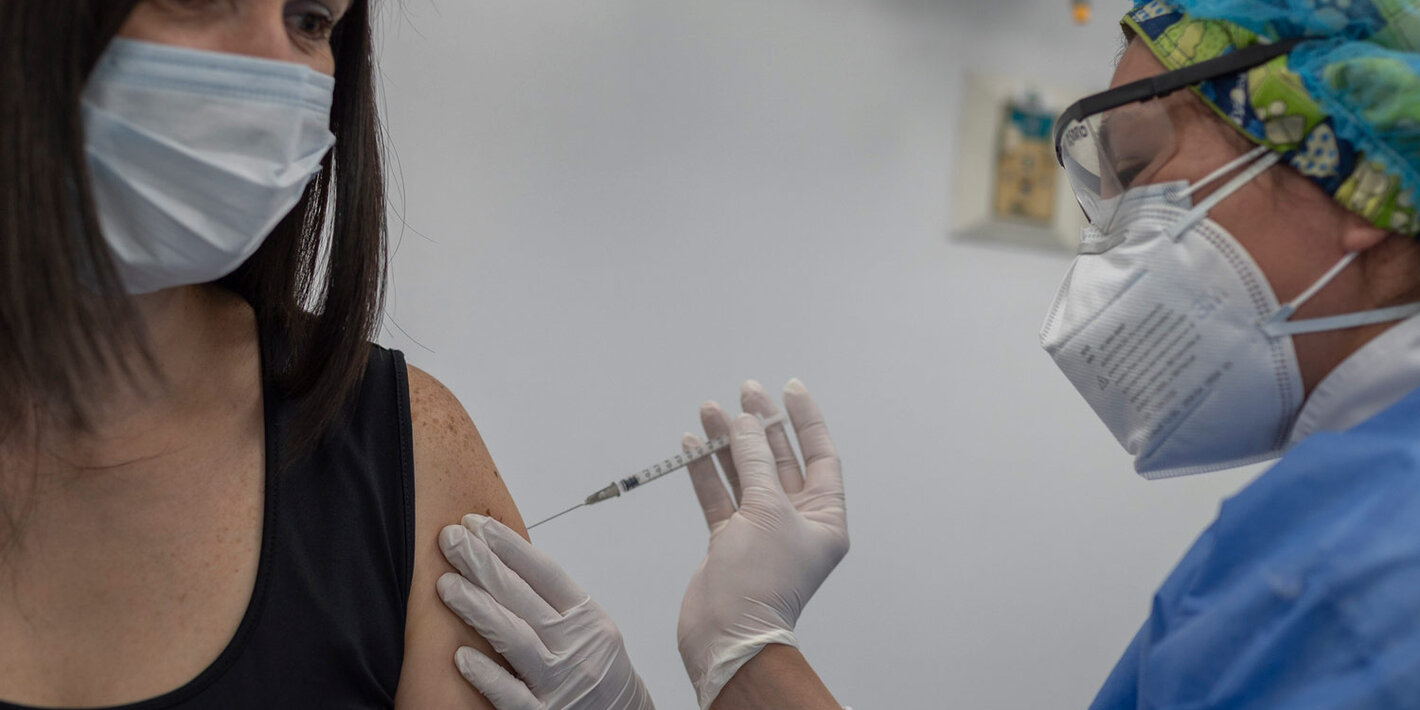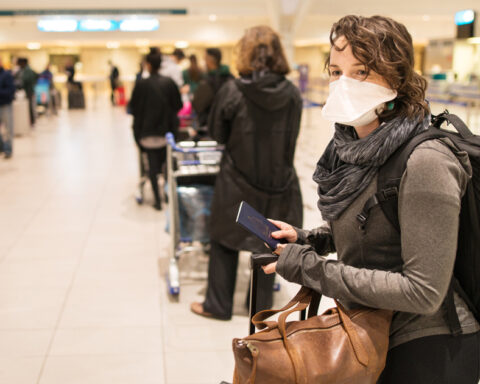Washington, DC, March 1, 2021 (PAHO/WHO)- The delivery is part of the “First Wave” initiative, a global pilot program in which some countries receive early delivery of a limited number of doses of the Pfizer/BioNTech vaccine as part of their total allotted quota. More doses of the Pfizer/BioNTech and AstraZeneca/Oxford vaccines are expected to arrive in coming weeks in the 36 countries participating in the mechanism in the region.
“Colombia, with support from COVAX partners, has worked incredibly hard to be in a position to be able to receive its first wave of vaccines from COVAX, and I pay tribute to all of those who have prepared diligently for this arrival,” said World Health Organization (WHO) Director-General Tedros Adhanom Ghebreyesus. “The arrival means that more health workers and high-risk populations can begin to be vaccinated. The COVID-19 pandemic can only end if vaccination occurs in an equitable way, and I am truly delighted to see vaccine doses in South America and other regions begin to be rolled out this week through COVAX.”
The 117,000 doses of the Pfizer/BioNTech vaccine that arrived today at El Dorado International Airport in Bogota, the nation’s capital, mark the beginning of the deployment of COVAX-procured vaccines in Latin America and come about one year after the first case was detected in the region.
During an event to announce the arrival of the vaccines in Colombia, President Iván Duque said, “Today marks a very important milestone, today COVAX makes its first delivery in the Western Hemisphere, and the first country to receive it is Colombia. We appreciate the joint, combined, and articulated work (with PAHO/WHO, Gavi, and COVAX partners).”

Asserting that Colombia is committed to multilateralism, Colombian president Duque said that with this first delivery in the region “it is clear that COVAX is active and works,” and called on “all of us to accelerate the distribution of vaccines through COVAX in the Americas.”
The COVAX vaccines add to the vaccination campaign that the Colombian government started on Feb. 17 with doses obtained from bilateral agreements with the producers. Colombia expects to receive 20 million doses of vaccines through COVAX in 2021.
With more than 50 million confirmed cases and more than 1.2 million deaths, countries of the Americas have experienced the worst impact of the pandemic. The region will need to immunize approximately 700 million people to control the pandemic.
“The arrival of these first doses in Colombia through the COVAX Facility is an encouraging step in the fight against this virus in the Americas,” said Director of the Pan American Health Organization (PAHO) Carissa F. Etienne. “In a context where the availability of doses is still very limited, PAHO will continue to support the great efforts of countries in the region to obtain as many vaccines as soon as possible.”
In addition to Colombia, Peru, El Salvador, and Bolivia are expected to receive Pfizer/BioNTech vaccines soon as part of COVAX’s “First Wave” initiative. The countries must finalize the administrative, legal and regulatory requirements to move forward with the process.
Following the recent WHO emergency use listing of two versions of AstraZeneca/Oxford’s COVID-19 vaccine, all countries in Latin America and the Caribbean are expected to begin receiving the first doses of these vaccines through COVAX starting in March, if all necessary conditions are met. These vaccines are produced by AstraZeneca-SK Bioscience (Republic of Korea) and the Serum Institute of India.
In this first phase, all countries will receive doses to vaccinate between 2.2% and 2.6% of their population, as designated by the producer. The only exceptions are Small Island States which will receive enough vaccines to cover 16% to 20% of their population, due to their size and the high logistical cost of delivering small quantities of vaccine.
Access to vaccines through COVAX will increase steadily month by month and about 280 million doses are expected to reach the Americas and the Caribbean by the end of 2021.
Until vaccination is widespread in the population, basic public health measures remain the foundation of the pandemic response. For public health authorities, this means continued screening, contact tracing, isolation, assisted quarantine, and quality care. And for individuals, it means continuing to practice physical distancing, hand hygiene, use of masks, ventilation of spaces, and avoidance of crowds.
COVAX is part of an unprecedented global effort to provide vaccines for at least 20% of the population in each participating country by 2021 to protect those most at risk for severe forms of COVID-19 and save lives. In the Americas, 36 countries will receive vaccines through the COVAX Facility, 26 of which will be self-funded, and ten of which will be free of charge.
The PAHO Revolving Fund is the mechanism designated by COVAX to procure the vaccines on behalf of the countries in the region.
COVAX is co-led by Gavi, the Vaccine Alliance, WHO, and the Coalition for Epidemic Preparedness Innovations (CEPI), and works in partnership with UNICEF, the PAHO Revolving Fund, as well as the World Bank, civil society organizations, manufacturers ,and others.






